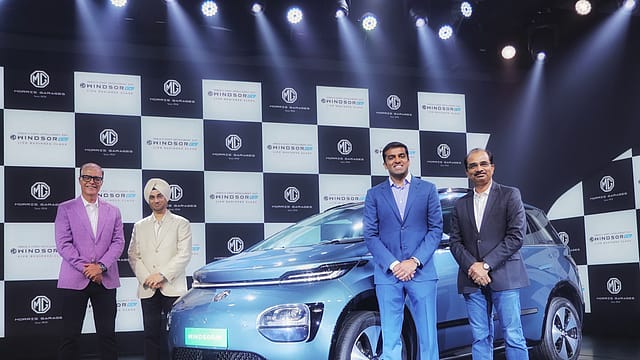JSW MG Motor debuts battery-as-a-service model with Windsor EV
ADVERTISEMENT

JSW MG Motor India on Wednesday launched its latest electric vehicle, the Windsor EV, with battery-as-a-service offering for ₹9.99 lakh. While this brings down the high upfront costs associated with EVs as customers do not own the battery, buyers, however, will have to shell out ₹3.5 per kilometre for its usage.
A customer must pay for at least 1,500 kms per month under the battery-as-a-service model, bringing the usage cost of the battery to ₹5,250 per month even if the user drives it for less than 1,500 km. This excludes vehicle charging costs.
The SAIC Motor-backed carmaker plans to announce the ex-showroom price with the battery by October 3, 2024, when bookings commence. Deliveries start from October 12.
The Windsor comes with a 38-kilowatt-hour battery pack that delivers 100 KW of power and 200 Nm of torque. It comes with a claimed range of 331 kms.
Explaining the rationale behind BaaS, Parth Jindal, director of JSW MG Motor India, says the majority of car sales in India happen under ₹10 lakh. "We want EV penetration to increase in this country. We don’t think we can do that if we play only in the higher price segment. We need to play in the ₹9-₹11 lakh segment, which is a big segment in the country," says Jindal.
"We don’t want to sell just 1,000 cars a month at ex-showroom price," the Jindal family scion says.
“With Windsor EV, MG Motor wants to compete with cars costing around ₹10 lakh. That is our ambition. We want this not to be only a Mumbai, Delhi, Kolkata Hyderabad and Chennai phenomenon. We want to go to Tier 2 Tier 3 Tier 4. We want EVs everywhere in this country. The only way of doing it is under the battery-as-a-service model,” says Jindal.
"The EMI for a ₹9 lakh ICE (internal-combustion engine) car is ₹25,000 per month. If you run 1,500 km per month with a mileage of 12 km per litre, it works out to roughly ₹8 per km as your running cost for fuel. So together, a customer spends ₹12,000 on fuel. Oil change and servicing is another ₹1,000 monthly. So, ₹38,000 is your out-of-pocket expenditure if you are buying a ₹9 lakh car. If you buy the Windsor at ₹9.99 lakh, your EMI comes to roughly ₹29,500 for the car, without the battery,” explains Jindal.
Windsor EV’s running cost under the BaaS scheme is around ₹6,750 per month with home charging, says Jindal. Customers pay ₹3.5 per kilometre for the battery and around ₹1 per kilometre for charging at home. "So, it is ₹36,250 for Windsor versus ₹38,000 for an ICE car. That’s the revolution we are bringing,” says Jindal.
If someone wants to pay the ex-showroom price, then their EMI will be higher, says Jindal.
JSW MG Motor India has partnered with four financiers including Bajaj Finance and Hero FinCorp to bring various battery financing options to customers, says Rajeev Chaba, CEO emeritus, JSW MG Motor India. The cost of owning the Windsor EV is equivalent to an ICE vehicle of ₹10 lakh, Chaba says.
JSW MG Motor India offers a “lifetime battery warranty” to the first owner of MG Windsor.
The carmaker says it is evaluating plans to bring the BaaS scheme for its other models to reduce the upfront cost of acquisition of EVs. Jindal says if battery prices come down further, then the cost of financing of the battery will also come down.
With the launch of Windsor EV, JSW MG Motor India is targeting over 50% EV of its sales to come from EVs within this calendar year. Currently, 35% of its sales come from battery electric vehicles. The carmaker now has three EVs and three internal-combustion engine cars in its portfolio.